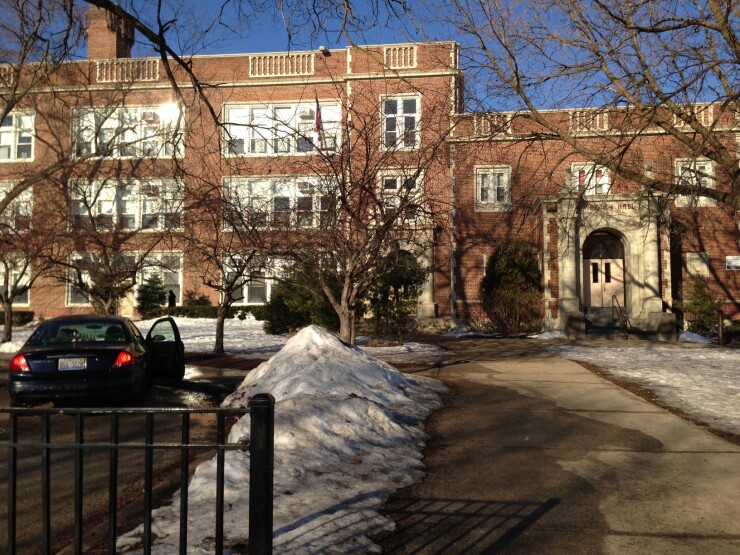CHICAGO – The Chicago Board of Education will sell $200 million of unrated tax anticipation notes Thursday in its first competitive note offering in recent memory.
The sale marks the district’s first TANs of the fiscal year that began July 1. The district has counted on short-term borrowing to manage through its budgetary and liquidity crisis as its operating fund balance tumbled from $1.2 billion in 2015 to a negative $275 million in 2017. The district is rebuilding and opened the year with a $231 million general operating fund balance.

Liquidity strains eased last year when the state approved an overhaul of school aid providing more funding and new pension support but the reliance on TANs continues, albeit at lower levels.
“Due to the district's strengthened financial footing, investors have expressed strong interest in CPS-backed securities and the district is able to competitively bid its TANs for the first time in recent memory,” Chicago Public Schools spokesman Michael Passman said in an emailed response to questions about the transaction.
“Competitively bidding TANs will ensure the district moves forward with the best possible deal so that more available resources” are available for operations, he added.
Short-term borrowing peaked at an authorized level of $1.55 billion in outstanding notes before droppinglast year to $1.1 billion. The board this year authorized up to $1.25 billion but the district currently anticipates needing no more than $994 million outstanding at any time.
The district has long counted on privately placing the paper with several banks at a high rates, with several issues last year paying 70% of the three-month London Interbank Offered Rate plus a spread of 330 basis points.
The rate on the new TANs is capped at 5%, according to sale notice.
Ice Miller LLP and Pugh Jones & Johnson PC are bond counsel, Katten Muchin Rosenman LLP and Cotillas and Associates are issuer’s counsel and Mayer Brown LLP is disclosure counsel. PFM Financial Advisors LLC and Columbia Capital Management are financial advisors.
The fixed-rate notes that mature March 29 are limited obligations of the district secured solely by pledged tax collections. The district’s levy for the year is $2.46 billion, doled out in two installments.
The revenue, which has a 96% to 99% collection rate, flows directly from the county to an escrow agent that sets aside the required amount to repay the notes before freeing up remaining funds for the district’s use. Short term borrowing is capped at 80% of the tax levy.
Based on cash flow projections, the district expects fresh TAN issues through February all of which would be repaid with the first installment levy. CPS will issue additional TANs in April through July repaid with second installment taxes.
Large debt service deposits and pension payments due in February and June, respectively, create “peaks and valleys” in cash flow, CPS chief financial officer Jenny Bennett said in a recorded investor presentation.
The type of sale used for future TAN sales “will depend on market conditions and cash flow,” the district said.
Under investment considerations in the offering statement, CPS lists warnings on its structural deficits over the last five years that hit a high of $1.1 billion.
While its fiscal position and prospects are improved “the board’s ongoing financial outlook will continue to be determined by factors such as labor, pension, and debt service costs as well as the ability of the board to raise revenues and reduce certain expenditures,” the offering statement says.
The district’s 2019 pension contribution is $809 million, of which $239 million will come from the state and $430 million from a special pension levy, both approved over the last two years. The teachers’ fund is at a 50.1% funded ratio with $10.9 billion. The teachers’ pension board recently revised its assumed investment rate down to 7% from 7.25% based on the advice of its actuary, said a fund spokeswoman. The new rate takes effect at the start of the new fiscal year.
The offering statement does not list under the litigation section any lawsuits directly linked to a sexual abuse reporting scandal or the potential for future fiscal liabilities or lawsuits. Some on the buyside believe such lawsuits loom and could pose a future burden for the district.
After a Chicago Tribune series this summer, CPS acknowledged its failure to take adequate action to protect students and to alert the proper authorities to investigate allegations of sexual abuse. Schools chief Janice Jackson implemented an overhaul of reporting requirements, training, and background checks and hired Schiff Hardin LLP to conduct an investigation. Further reforms could follow a final report expected next year.
The board “has available to it a tort liability tax levy to pay tort judgments and settlements” and it is “unlimited as to rate but subject to limitations on the annual growth in property tax extensions of the board” imposed by state caps, the offering statement’s litigation section says.
The district’s fiscal 2019 budget package included a $6 billion operating budget and plans for more than $2 billion of new money, refunding, and short-term borrowing. The board has authorized $500 million in general obligation refunding, $313 million of general obligation-alternate revenue source bonds and up to $125 million of bonds under its investment grade dedicated capital improvement tax levy.
The district has received a series of positive credit actions since the state approved new funding, the latest coming S&P Global Ratings, which upgraded it to B-plus from B in July, still well below investment grade. “A cloud of uncertainty and questionable decisions arising from a variety of ongoing issues” precludes a higher rating, according to S&P.
S&P's reference to a "cloud of uncertainty and questionable decisions" stems from a variety of ongoing issues — notably increased operational spending and the affordability of capital spending in fiscal 2019 and beyond, special education spending pressures, and unresolved sexual harassment scandals and lawsuits.
Three of the four rating agencies still hold the district at junk levels with Kroll Bond Rating Agency assigning a low investment grade rating.





